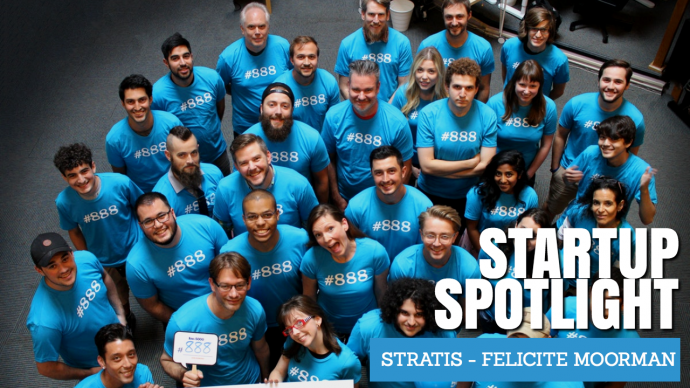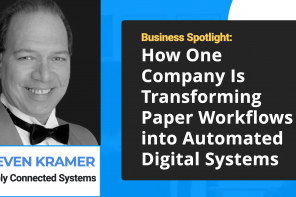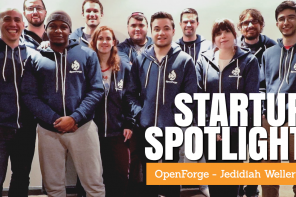Philadelphia-based startup STRATIS offers access, energy, and automation management and control for commercial residential, or multifamily properties, enabling them to create ‘smart’ apartments and buildings. As the only IoT Platform built for the complexities of multifamily and student housing, STRATIS is leading the global movement for smart cities in the urban-residential sector. To date, they have over 250,000 units in the U.S. and Japan.
We caught up with STRATIS CoFounder Felicite Moorman for an exclusive Startup Spotlight interview:
How did the inspiration to start STRATIS come about?
My CoFounder and I have worked in the IoT (Internet of Things) space for a considerable period of time, and I think it’s fair to say we’re both hardware junkies. But, we found limitations for hardware, limitations that required cost-effective but complex software, to address the needs of exceptionally complex building infrastructure.
We received a phone call, requesting we connect 300 thermostats on a garden-style, MultiFamily campus (apartments). The software simply didn’t exist for the property owner to control devices in a way that created energy efficiencies and protected their residents’ comfort and privacy, especially across such a large campus.
We certainly didn’t know what we didn’t know about software, at least at this level of complexity, but we knew if we could lean into our complete and total commitment to using exceptional hardware, and model our software use cases around an invested client, that property owner, we could change the world of energy efficiency for complex buildings.
I like to think we all share that childhood dream of changing the world.
What problem is STRATIS aiming to solve?
For the first time in world history, more of us live in cities or urban areas, than not. That means that we cannot afford to have inefficient buildings. Sometimes commercial residential real estate (apartment buildings) are 60 percent or more of the footprint of a city. And those 3.7 billion people living in cities today, worldwide, will double in just three decades. These are nearly unfathomable numbers for the human mind to create meaning around, so just imagine double the traffic on The Schuylkill, or the people in our classrooms and emergency rooms, and you start to get the picture.
Time is absolutely of the essence to create more efficient infrastructure in which to live. Our focus began on energy efficiencies, but every efficiency, from natural resources to labor, to safety and security, are part of the STRATIS platform now.
How is STRATIS different from similar competitors?
Our perceived competitors are creating stackable smart homes or smart apartments. These are unit-focused novelties, smart devices connected (hopefully) on one Resident app, a top of the market, “Class A” play.
I think our real competitors, should they decide to actively engage this market, would be Johnson Controls, Siemens, and Schneider Electric. Unlike our perceived competitors, these companies create whole building solutions, and not only manage devices but automate and control them, property-wide.
Today, they focus primarily on commercial real estate, which has a far higher budget, but what we’ve created at STRATIS is that complex building operating system, with a return on investment that meets the needs of our multifamily market.
And in fairness, the end result of our installation can easily create a very smart apartment for the resident. More importantly, though, STRATIS creates an intelligent building with the owner or operator in mind, thereby incentivizing their investment in these technologies to create world-changing efficiencies.
VC, Angel Investors or Bootstrapped?
Primarily bootstrapped with some strategic investment around our launch in Japan.
What is the greatest lesson you’ve learned so far?
Painfully, it’s how little I know.
I’ve got to be constantly eager and willing to learn, and curious about new technologies, the market, our Team, basic human psychology, anything that I can learn in the world, as a start-up leader. I’m surprised daily, and I spend a considerable amount of my time on rivers of information, to educate my decisions, and help me enable my team, and the decision makers that are my clients.
If you could have anyone in the world to your team, who would you choose?
This may sound trite, but the Team I have is what keeps me going on the hardest days. There are more than a handful of people for whom I would do anything, sacrifice beyond reason and measure because they do that for STRATIS. If I could add others to enable them more, it would be Reid Hoffman and Chris Yeh. I’m reading their book Blitzscaling right now, and it’s another testament to how much I don’t know … yet.
What are some unexpected hurdles you’ve faced?
I’m always shocked that we literally offer a technology solution that is a decade beyond our perceived competitors, and I’m still not easily or efficiently able to educate the market as to the vast differences in those solutions. STRATIS is the beneficiary of decades of technical expertise, and that creates a profound differentiator in our product. It is always a shock to me that I can’t snap my fingers and make people know that STRATIS is real and that it really is that different. Educating the market is a perpetual hurdle I didn’t expect to be this high.
I take it very personally when I see a MultiFamily Property Owner make a decision that is not future-proofed.
Your favorite team building activity is:
We have a pretty diverse team and I’ve found that inevitably, no single activity appeals to everyone.
Twice a year we do a 100 km bike ride. My favorite part is the picnic in the middle! I’m the support vehicle, since I’m not a cyclist, but I love that everybody feels so accomplished at the end of that ride. I love hanging with our Team doing karaoke or any musical activity, really. I love our movie nights, where we just hang out and watch back to back movies in a series. I love when our team is able to do yoga together. I love river rafting together. It’s so fun to be stuck in a river, with your team, chit chatting for six hours. I love our game nights, and while I don’t play Dungeons & Dragons, some of the most fun I’ve had with our team is watching them play.
I think it’s fair to say we spend a lot of time together outside of work hours.
Where do you envision STRATIS in 5 to 10 years?
As I mentioned, I’m reading Reid Hoffman and Chris Yeh’s book Blitzscaling, so let me finish the book and I’ll have an answer for you.
I think that what STRATIS is creating is necessary for every single apartment building today. As our population increases and our resources decrease, it will become more necessary. My goal is to install a ubiquitously applicable solution across the world in commercial residential real estate.
The biggest thing you look for when hiring is:
We look for culture add and competency. Everything else we can teach.
What advice would you give to entrepreneurs just starting out?
I highly recommend bootstrapping. I can’t stress that enough, especially for women.
Watch your market and make sure that bootstrapping can be effective for what you want to do, and if it can’t be (and technology is an especially hard place to bootstrap), maybe reconsider the model.
Finally, fix a real problem. Don’t try to create a market where there isn’t one. Focus on low hanging fruit and problems that we already face. For instance, can somebody fix printers already?!
Learn more and connect with Felicite:
https://stratisiot.com/
https://www.linkedin.com/in/felicitemoorman
https://twitter.com/FeliciteMoorman




